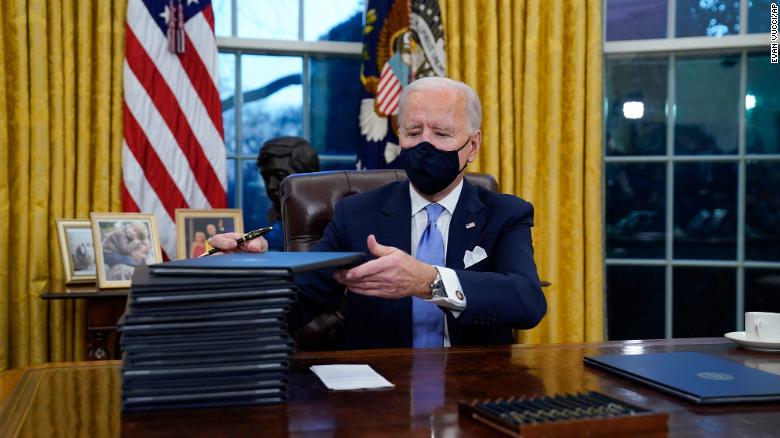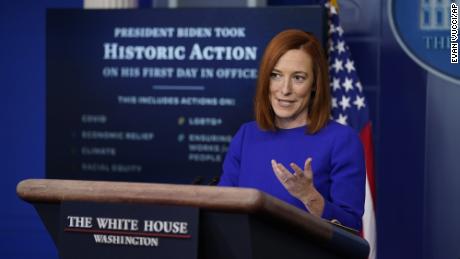Within hours of taking office, US President Joe Biden set to work signing a blizzard of executive orders, memorandums and directives to agencies, ranging from steps to combat the coronavirus to beginning the process of rejoining the Paris climate accord.
To the outside world, the powers of a US president to make sweeping changes with a stroke of his or her pen can seem bewildering. Every four or eight years, an incoming leader can upend the policies of his predecessor and leave international allies struggling to keep up.
Biden set a new record by signing 17 on his first day in office and he has plans to sign more. Some of them will have a significant impact beyond America’s borders.
So how do they work?
The president’s “executive power” relies on a wide, but vague, set of prerogatives granted to the US president in Article II of the Constitution. Every president dating back to George Washington has used executive powers in some fashion or another — some more than others.
Trump signed 29 executive orders in his first 100 days, back in 2017, as he sought to get quick wins on the board. That was more than any President since 1945, when President Harry Truman signed 57 orders in his first 100 days.
By the time Trump left office, four years later, he had signed 220, or an average of 55 a year, according to data from the American Presidency Project at the University of California at Santa Barbara.
That compares with 291 in the course of President George W. Bush’s eight years in office and 394 over President Bill Clinton’s two terms, according to the same data. Meanwhile, Barack Obama averaged fewer executive orders per year in office than any US President in 120 years, issuing 276 executive orders in total during his eight years in office, or roughly 35 per year.
Notably, Biden’s first actions reversed several of Trump’s attempts to pull out of international agreements, from starting the process of rejoining the Paris climate accord to halting the US withdrawal from the World Health Organization (WHO).
Biden also halted funding for the construction of Trump’s border wall and reversed his highly controversial travel ban targeting largely Muslim countries.
Next week, he plans to revoke the so-called Mexico City Policy, which bars international non-governmental organizations that perform or promote abortions from receiving US government funding, according to a draft of a calendar document sent to administration allies and viewed by CNN.
Climate policy whiplash
Short lived or not, the changes enacted through executive orders can have a serious impact on US relations with other nations and on international organizations whose activities are affected by shifts in US policy and funding.
And the upheaval every four or eight years when a new administration comes in can leave policymakers feeling like they have whiplash.
A prime example is the Paris Agreement, the landmark international pact signed in 2015 under Obama to limit global warming. The US abandoned the non-binding agreement late last year on Trump’s orders and the former president spent much of his time in office weakening many of the country’s key climate and environmental guardrails.
Biden’s swift move to rejoin the accord is significant, especially with the COP26 climate conference in Glasgow, Scotland, on the horizon.
“It sends a very important signal to the rest of the world on one of the biggest problems we face,” said John Holdren, a professor of environmental science and policy at Harvard University who served as director of the White House Office of Science and Technology Policy under President Barack Obama. “I think it is very important that the US demonstrates once again that it will take the global climate change challenge seriously.”
How long the US will take the challenge seriously for, however, is an open question.
When Trump pulled out of the accord, it was not the first time that the US had left an international climate agreement after leading the negotiations. The US signed the Kyoto Protocol more than two decades ago under then-President Bill Clinton, only to bail a few years later under President George W. Bush.
Speaking in the Senate on Thursday, Republican leader Mitch McConnell slammed Biden’s decision to reenter the Paris Agreement as “a terrible bargain that would set us up to self-inflict major economic pain on working American families.”
To prevent further flip-flops on climate policy, Biden would have to get Congress on side so that legislation can be passed that can’t simply be overturned by a new administration, said Leslie Vinjamuri, director of the US and the Americas Programme at UK-based think tank Chatham House and associate professor in international relations at SOAS University of London.
“If you don’t go through the hard work of building the consensus that it takes and building the coalitions and striking the deals to get something through Congress, you just don’t have staying power,” she said. “So, you know, in Paris one day, out of Paris the next — it’s not quite as quickly as that but you know it’s pretty darn quick because it took a long time to unravel Paris.”
‘Chilling effect’
Meanwhile, the see-sawing between Republican and Democratic administrations over the Mexico City Policy, also known as the “global gag rule,” could carry on for as long as women’s reproductive choices remain an ideological battleground for the two parties.
The measure was initially put in place by the Reagan administration in 1984, and has since been rescinded and reinstated by subsequent administrations along party lines — with the result that it has been in effect for 19 of the past 34 years, according to the non-profit organization KFF.
The policy was last rescinded by the Obama administration in 2009. Three days after he was sworn in in 2017, Trump signed an executive action reinstating it.
Even during the Obama years, US law banned direct funding for abortion services. But NGOs that performed the procedure were allowed to receive US funding for other programs, including those related to contraception access and post-abortion care.
However, after Trump reinstated the Mexico City Policy, NGOs that offered or promoted abortions as part of their family planning services were prevented from receiving any assistance from the US Agency for International Development (USAID), one of the largest contributors to international development assistance.
MSI Reproductive Choices, which describes itself as one of the world’s leading providers of reproductive healthcare, urged Biden to follow the lead of past Democratic presidents in revoking the order, saying Thursday it would be “a huge step forward into a new era.”
It argues the see-sawing on this policy has real consequences for women, particularly in developing countries. In a 2020 report, MSI — formerly known as Marie Stopes International — said continued USAID funding would have allowed it to serve an estimated 8 million women, preventing an estimated 6 million unwanted pregnancies, 1.8 million unsafe abortions and 20,000 maternal deaths.
“MSI has never and will never sign the Global Gag Rule and in 2017, this meant we were unable to access USAID funding. For many of our programmes, in Uganda, Madagascar and Nepal, to name but a few, this led to service closures, a recorded rise in unintended pregnancies and unsafe abortions and a broader chilling effect, impacting partnerships and advocacy for women’s healthcare,” it said in a statement.
“We call on partners to not let the impact of the Global Gag Rule outlive Trump’s presidency. Even if the Global Gag Rule is revoked, USAID funding would likely not be available in the near term to providers like MSI who took a stand against the Global Gag Rule, and any future funding would not cover safe abortion care.”
American leadership
Another dizzying about-face with global repercussions concerns US membership of WHO, a body that has been at the forefront of the international response to the coronavirus pandemic.
Trump announced last year that the US was formally withdrawing from the body, after he said it “failed to make the requested and greatly needed reforms.” The withdrawal was due to take effect in July 2021.
But Biden issued an executive order on his first day halting that withdrawal.
Global Health Council, which represents the global health community, welcomed Biden’s re-engagement with WHO, having last year described Trump’s move as a “dangerous gamble.”
There’s no guarantee that a future Republican president would not follow the precedent set by Trump and haul the country back out of WHO.
But Kate Dodson, vice president for global health at the UN Foundation, said Biden’s move was “a welcome first step in restoring America’s global health leadership” and urged sustained US funding to help WHO safeguard the health of all people, including Americans.
Biden appears to see an opportunity in the first, closely watched weeks of his presidency to repair some of the damage done to US credibility on the international stage by Trump’s often knee-jerk actions.
According to the draft calendar document seen by CNN, the focus for February is “Restoring America’s Place in the World.”
Steps the administration plans to take include an executive order which would reinstate the policy of closing Guantanamo Bay, and a memorandum on LGBTQI+ rights abroad.
Biden’s swift move to reverse Trump’s ban on travel from certain Muslim majority countries may also help to reassure international partners.
“(The ban) sent a horrific signal to the rest of the world. So I think for the Biden administration it’s been so important to say, we will have a very measured position on immigration,” said Vinjamuri.
European allies are well aware that 74 million American voters chose Trump, said Vinjamuri, and despite Biden’s election victory they may be wary of placing too much trust in America.
“I think the big outstanding question for the UK and some of these European governments is what we’re going to see in the next 100 days and, over the course of the four years, where America is really going to remain — or do we need to protect ourselves against an erratic and unpredictable and constantly changing America?” she said.
Vinjamuri suggests that as they seek to reassure America’s allies, the Biden team could try to show that the country’s foreign policy commitments have staying power by making use of concrete mechanisms such as treaties and legislation to lock them in, rather than relying on executive actions.
One example of this could be the Iran nuclear deal. Trump pulled the US out of the multilateral agreement — negotiated by Obama and much disliked by US Republicans — in May 2018.
Rather than an immediate return to that deal, Vinjamuri predicts the Biden administration will embark on “a real effort at consultation” with Congress and work with Europe and regional partners such as Saudi Arabia and Israel in order to create “something much more sustainable and which more people think will have traction.”
Biden has previously expressed a desire to return to the 2015 agreement, writing for CNN last year that Trump had “recklessly tossed away a policy that was working to keep America safe and replaced it with one that has worsened the threat.”
But other signatories may need to be persuaded of America’s longterm commitment. Since the Trump administration pulled out of the pact, imposing punitive sanctions on Tehran instead, Iran has resumed enriching uranium to 20% purity, far beyond the limits laid out in 2015.
Iran’s President Hassan Rouhani said Wednesday that “the ball was “in the US court now” as he urged Biden to rejoin the deal. “If Washington returns to Iran’s 2015 nuclear deal, we will also fully respect our commitments under the pact,” he said.
>>>>











